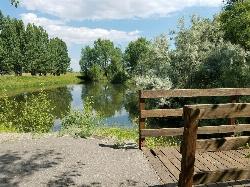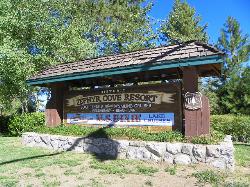Disc Golfing
Are you ready to join the fast-growing sport of disc golf? This thrilling outdoor activity combines the strategy of golf with the athleticism of throwing a frisbee. With courses popping up all over the world, it's easy to find a place to play.
So, what is disc golf? It's a game where players throw a specialized golf disc (similar to a frisbee) from a tee pad to a basket target. The goal is to complete each hole in the fewest number of throws. Just like traditional golf, each hole has a par score that represents the expected number of throws it should take an experienced player to complete.
Disc golf can be played almost anywhere, from city parks to wooded forests. Many courses are free to use and can be found on the Professional Disc Golf Association's website or by using the Disc Golf Course Review app.
One of the great things about disc golf is that it's easy to learn and can be enjoyed by people of all ages and skill levels. The basic rules and techniques can be picked up quickly, making it a fun activity for the whole family.
So why give disc golf a try? For starters, it's a great way to get outside and get some exercise. It's also a great social activity, as many players enjoy playing in groups and meeting new people on the course. And with the low cost of equipment and free access to many courses, it's an affordable way to have fun.
Ready to give disc golf a shot? Here's what you'll need to get started:
A set of golf discs: these come in a variety of weights, sizes, and shapes to suit different throwing styles and shots. It's a good idea to start with a beginner set that includes a putter, midrange, and driver disc.
A disc golf bag: this will help you carry your discs and any other gear you might need on the course.
Comfortable shoes: you'll be walking and throwing, so wear shoes that are comfortable and provide good support.
Now that you have the basics, it's time to hit the course! Find a nearby course and give disc golf a try. With a little practice and a lot of fun, you'll be well on your way to becoming a disc golf pro.
Here's some of our favorite folf courses

Beaver Dick Park
Rexburg, Idaho
5.7 miles W of Rexburg, IdahoBeaver Dick is a park 4.5 miles west of Rexburg, Idaho on Hwy 33. It's a 9.5 acre park that passes next to the west bank of the Henry Fork of the Snake River; it's a popular...
Camp, Canoe, Disc Golf, Swim 0.1-0.3 mi
Rexburg Nature Park
Rexburg, Idaho
0.8 miles NW of Rexburg, IdahoRexburg Nature Park: Life can be stressful, annoying, or just not good. Sometimes, it takes a moment to simply get away from the non-sense of this world; to gather yourself and seek peace and...
Disc Golf
Champoeg State Park
Saint Paul, Oregon
4.9 miles NE of Saint Paul, OregonChampoeg State Park (commonly pronounced SHAM-poo-EE) is a historic pioneer site as well as a beautiful outdoor recreational area. The Native Americans originally pronounced it CHAM-po-EGG, but it...
Camp, Disc Golf, Hike, Mountain Bike
Zephyr Cove Park
Glenbrook, Nevada
5.5 miles S of Glenbrook, NevadaZephyr Cove Park is located 4.6 miles off highway 50 in Nevada. This park is a great place to have your summer activities; it includes Picnic tables for groups and couples, Barbecue...
Camp, Canoe, Disc Golf, Hike, Horseback, Kayak, Swim
Groves Park, East Juniper Drive, Tucson, AZ, USA
Tucson, Arizona
6.5 miles SE of Tucson, ArizonaA mostly grassy recreation ground fenced in by a combination of bushy trees and cacti, Groves Park is one of the popular hot spots for Tucson Disc Golf Meet Up...
Disc Golf
Oshtemo Township Park
Kalamazoo, Michigan
5.4 miles W of Kalamazoo, MichiganLocated in Kalamazoo, Michigan, Oshtemo Township Park is a picturesque recreational area that offers a wide range of activities for visitors of all ages. Spanning over 110 acres, the park features...
Disc Golf
Sewell Park
San Marcos, Texas
0.6 miles NE of San Marcos, TexasSewell Park is the perfect place too cool off on a hot day. The park is located on Texas State University campus along the crystal clear San Marcos River. Visitors can enjoy the 72-degree...
Canoe, Disc Golf, Kayak, Swim
West Delray Regional Park
Delray Beach, Florida
8.9 miles W of Delray Beach, FloridaSome length through less well kept park land. Beware of bugs (bring spray), snakes and gators. Do not go in water after discs. Poorly marked - bring map to navigate. Public (No Fee)
Disc Golf, Mountain Bike
Markham Park
Sunrise, Florida
7.1 miles SW of Sunrise, FloridaNice course flow in a beautiful park. Water in play on #2. Public (No Fee) All in all, I'd say this is one of the best mountain bike trails that South Florida has to offer.
Disc Golf, Mountain Bike
Prince Solms Park
New Braunfels, Texas
0.4 miles N of New Braunfels, TexasPrince Solms Park is known for its strikingly blue, refreshing waters. Located on the Comal River this 19-acre park is the perfect spot for swimmers and tubers to enjoy for the day. Prince Solms...
Disc Golf, Swim- Plan Ahead and Prepare. Know the regulations and special concerns for the area you'll visit. Prepare for extreme weather, hazards, and emergencies. Schedule your trip to avoid times of high use. Visit in small groups when possible. Consider splitting larger groups into smaller groups. Repackage food to minimize waste. Use a map and compass to eliminate the use of marking paint, rock cairns or flagging.
- Travel & camp on durable surfaces. Durable surfaces include established trails and campsites, rock, gravel, dry grasses or snow. Protect riparian areas by camping at least 200 feet from lakes and streams. Good campsites are found, not made. Altering a site is not necessary.
- Dispose of waste properly. Pack it in, pack it out. Inspect your campsite and rest areas for trash or spilled foods. Pack out all trash, leftover food and litter. Deposit solid human waste in catholes dug 6 to 8 inches deep, at least 200 feet from water, camp and trails. Cover and disguise the cathole when finished. Pack out toilet paper and hygiene products. To wash yourself or your dishes, carry water 200 feet away from streams or lakes and use small amounts of biodegradable soap. Scatter strained dishwater.
- Leave what you find. Preserve the past: examine, but do not touch cultural or historic structures and artifacts. Leave rocks, plants and other natural objects as you find them. Avoid introducing or transporting non-native species. Do not build structures, furniture, or dig trenches.
- Minimize campfire impacts. Campfires can cause lasting impacts to the environment. Use a lightweight stove for cooking and enjoy a candle lantern for light. Where fires are permitted, use established fire rings, fire pans, or mound fires. Keep fires small. Only use sticks from the ground that can be broken by hand. Burn all wood and coals to ash, put out campfires completely, then scatter cool ashes.
- Respect wildlife. Observe wildlife from a distance. Do not follow or approach them. Never feed animals. Feeding wildlife damages their health, alters natural behaviors, and exposes them to predators and other dangers. Protect wildlife and your food by storing rations and trash securely. Control pets at all times, or leave them at home. Avoid wildlife during sensitive times: mating, nesting, raising young, or winter.
- Be considerate of other visitors. Respect other visitors and protect the quality of their experience. Be courteous. Yield to other users on the trail. Step to the downhill side of the trail when encountering pack stock. Take breaks and camp away from trails and other visitors. Let nature's sounds prevail. Avoid loud voices and noises.

















